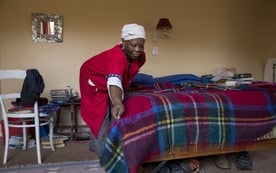9am NY / 10am Montevideo / 2pm London / 3pm Brussels / 4pm Nairobi / 8pm Bangkok
The COVID-19 Pandemic has starkly exposed how the role of care is central to sustain life in our societies. In a context of a health crisis, where “staying at home” is one of the main strategies to face the emergency, care arrangements have become more complex while sexual division of labor continues to weight on women. Furthermore, there is an added pressure in the form of forced teleworking, which leads to situations where the boundaries between paid work and unpaid care work become blurred, working conditions become precarious and rights are easily violated.
While some countries and some working sectors are coping more successfully with the emergency situation, most, especially those countries in the Global South, face a more serious form of exploitation already imposed by the pre-existing global financial capitalist model.
On Wednesday, 29 July, 2020, WIEGO’s Director of Social Protection, Dr. Laura Alfers was one of the distinguished speakers at a webinar entitled, Care and Labor Rights: Challenges from the Capitalist Pandemic, which was hosted by DAWN and the Women’s Working Group on Financing for Development.
This webinar explored a number of questions including:
- Can the harshness of the exposure of deepening inequalities serve as a spark to ignite and accelerate processes of transformation towards a “new normal” that is indeed new and different from the old normality?
- What feminist strategies can we draw on to activate an agenda of transformation in the world of work that serves women, people and the planet?
- What new challenges do we face and how should we adapt our analysis, our advocacy, our activism?
- What space can we create so that the post-COVID-19 pandemic does not continue to be a capitalist pandemic?
Objectives
- To draw key elements of the agenda of transformation in the world of work from a feminist perspective.
- To Identify common strategies across movements working on informal economy, care and work with different groups and constituencies ( migrants, domestic workers, grassroot women, rural women, women in health sector).
- To map advocacy spaces and mechanisms within the UN that may be used to activate our agenda of transformation of the world of work.
- Facilitate cross-movement building and solidarity among civil society groups and activists mobilizing for care, workers’ rights, gender equality.
Moderator
- Mareen Buschmann, Senior Advocacy and Policy Advisor-Women’s Economic Empowerment, CARE International UK
Panellists
- Laura Alfers, Director, Social Protection Programme, Women in Informal Employment: Globalizing and Organizing (WIEGO)
- Corina Rodriguez, Executive Committee Member, DAWN
- Shahra Razavi, Director, Social Protection Department, International Labour Organisation
Respondent
- Nancy Kachingwe, Independent Policy & Advocacy Strategy Advisor, South Feminists Alternatives
